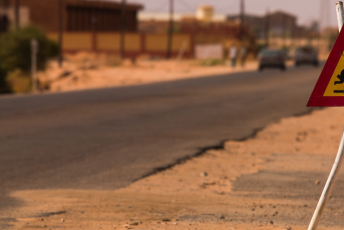In recent years, the government of Côte d’Ivoire has actively raised awareness among its citizens of the dangers of migrating without adequate and verifiable documentation and information. This however hasn’t dissuaded Ivorian youth from seeking the help of smugglers to travel to Europe through North African countries.
‘The problem is that young people look to everything outside their borders as a model of development and as a model of social success … Some still think they can follow obscure paths to succeed in soccer in Europe,’ says Issiaka Konaté, head of the Directorate General for Ivorians Abroad.
Open source statistical information shows that Côte d’Ivoire ranks among the top countries of origin for migrants from West Africa to Europe. The United Nations International Organization for Migration (IOM) report published in French in August 2020 entitled Return Migration: Link between Irregularity and Increased Vulnerability of Ivorian Migrants in Tunisia, Morocco and Algeria provides such vital data. With nearly 25 000 Ivorians arriving in Italy by sea since 2016, the number of Ivorian migrants using the Central Mediterranean route to Europe is the third highest after Nigerians and Guineans.
The high numbers Ivoirian migrants were initially triggered by political upheaval between 2002 and 2010. However, in the 10 years since this period, irregular migrants continue to travel to North Africa and on to Europe. Côte d’Ivoire’s controversial 31 October elections that saw Alassane Ouattara win a third term in office, the dissatification and insecurity of this result could see even higher numbers migrating through north Africa.
IOM’s head of information in Côte d’Ivoire, Aude Nanquette told ENACT that about half of migrants leave Côte d’Ivoire legally to travel to a European or Maghreb country (especially Tunisia and Morocco). Interviews conducted with 6 757 Ivorian migrants (who agreed to return between May 2017 and May 2020) for the 2020 IOM report revealed that Tunisia, Morocco and Algeria serve as transit and and sometimes destination countries for most Ivorian migrants.
While almost all migrants travel legally to Tunisia and Morocco where Ivorians are eligible for a 90-day visa-free stay, those who travel to Algeria use smugglers to assist their entry without visas. These options all carry significant risks to the migrants.
Referring again to the IOM report, out of 7 511 migrants assisted to return to Cote d'Ivoire between 2017 and 2019, 2 325 returned from Niger, having been expelled for being in Algeria irregularly. For 61.3% of migrants assisted to return to Cote d’Ivoire in 2019, Algeria was a destination and transit country of choice for regular or irregular migration as it is seen as the easiest access to Europe. This is after crossing the desert by road through Mali and Niger.
In Tunisia or Morocco irregularity sets in when migrants overstay their visas or fail to obtain residency permits that would allow them to stay and work legally. A risk analysis detailing access to Europe from all the three countries shows that smugglers exploit the migrants’ and offer them dangerous means of transport in makeshift boats to cross the Mediterranean Sea using the so-called western and central routes.
Exploitation begins right from Côte d’Ivoire for those who can’t afford air tickets and opt to obtain ‘boxing tickets’. This term refers to a ticket purchased through an intermediary in Côte d’Ivoire, a travel agency employee or a person in Morocco. The migrant must repay the cost of the air ticket and other fees amounting to FCFA 500 000 (US$900) once they reach their destination. This repayment is with interest at sometimes two or three times the original amount, says the IOM report.
Migrants sign contracts to repay the ticket costs, in addition their passports are confiscated upon arrival in Morocco until the repayment is complete. This sets in motion physical, emotional and sexual abuse and exploitation by employers in collusion with the traffickers.
The Ivorian government has taken important steps to raise awareness of these risks and to assist returnees, especially through its Directorate General for Ivorians Abroad (DGIE). The DGIE is tasked with implementation of an holistic and sustainable response to irregular migration. However, this is not supported by legislation that could deter migrant smuggling.
ENACT research shows that Côte d’Ivoire is not among 22 African countries that have criminalised the offence of ‘smuggling of migrants’ defined broadly in line with the 2000 UN Protocol against the Smuggling of Migrants by Land, Sea and Air and supplemented by the Convention against Transnational Organised Crime. This protocol requires state parties to adopt legislation and measures that criminalise acts of smuggling of migrants or abetting such acts as producing, procuring or possessing fraudulent travel or identity documents, and enabling a foreigner to remain in a country in contravention of necessary requirements for legal residence.
The head of the DGIE, Issiaka Konaté, notes that international cooperation for an agreed policy on visa requirements for migrating citizens is necessary as is greater political harmonisation in all departure, transit and host countries. Such a policy would include information on the country’s travel hubs, border points and youth centres to inform migrants travelling to transit and destination countries like Algeria, Morocco and Tunisia, and European countries.
Most importantly, It would promote informed choices for would-be migrants and together with stringent legislation, potentially deter smugglers who prey on ignorance through misinformation.
Deo Gumba, Research Consultant, ENACT Project







